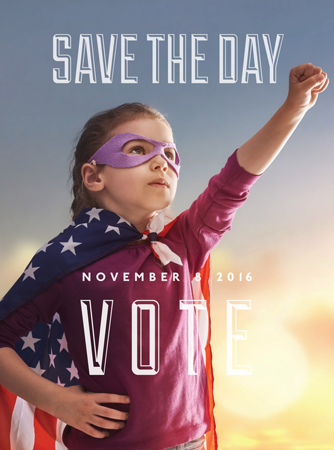In the midst our frantic school day morning routine, my two-and-a-half-year-old daughter calmly sat alone, eating her oatmeal at the kitchen island, her only company the morning news coming from the kitchen radio. I was in the small bathroom off of the kitchen encouraging my son to quickly, but thoroughly, brush, brush, brush! before the bus comes, when I heard my daughter announce I want to vote.
I stopped and took in the moment.
My daughter, like me, may take for granted that women have the right to vote. She lives in a world with increasing opportunity. She rides a bike, wears pants, is learning to read, receives care from women doctors, rides buses driven by women. She has aunties who are newspaper reporters, scientists, and engineers. She may even have the benefit of seeing a woman lead our country for her next four formative years, which will bring her to age 7.

In 2017, we may celebrate the inauguration of the first woman president. In my progressive home state of New York, we will also celebrate 100 years since women won the right to vote. In the US as a nation, we will celebrate that milestone in 2020.
I recently brought my three kids to Seneca Falls, NY widely regarded as the birthplace of the US women s suffrage movement. There, in the historic Wesleyan Chapel, we heard a reenactment of Elizabeth Cady Stanton s 1848 delivery of the Declaration of Sentiments.
In her declaration, Cady Stanton laid out the sentiments for which the document is named. She challenged her status of no right to vote; no representation in government; being legally dead if not married; no right to own property; no right to divorce; little access to higher education; subordinate positions in the church; no ability to control her own reproductive well being.
After the passionate reenactment, I declared to myself, I m with Her.
The document was signed that July day in 1848 day by 68 women and 32 men 100 out of some 300 attendees at the first women’s rights convention to be organized by women.
Following the convention in 1848, one regional newspaper described the document as “the most shocking and unnatural event ever recorded in the history of womanity. I find it one of the most daring, one of the most significant, and certainly one of the most inspiring for all of us who are still working to assert these sentiments our fundamental rights.
Although we have had the right to vote in this country for nearly a century, our reproductive rights remain under threat by political establishments, such as the Trump campaign. And although we now have good access to education by some measures, the cost of college is on the rise and the specter of debt is a major barrier to pursuing higher education. That scenario is made worse by the persistent wage gap that undervalues woman s education when compared to men. In the State of Wyoming the first state to grant women the right to vote women earn only 64% of what men earn. The statistic is far worse for women of color.
Beyond the US, in other parts of the world, women are still struggling to earn many of the rights that were considered so radical in 1848 America and are so taken for granted today. The right to own property. The right to our own financial resources. The right to divorce. These rights seems basic to women in the West. But women around the world live each day without access to them.
At the Alliance for Science, we fight for access and choice.
We women, people of color, men without means have won the right to access the vote. Now we must use it in the 2016 election year to make the choice that will further positive advancements for women in this country and around the world. We cannot let bigotry reign.
I read a headline recently: Women define the 2016 election. This is the headline that Elizabeth Cady Stanton and all of her brothers and sisters of suffrage fought for.
Break that glass ceiling, Hillary. Break it fueled with all of the energy of Elizabeth Cady Stanton, Matilda Jocelyn Gage, Harriet Tubman, Lucretia Mott, and their many sisters who fought for our right to vote, but never themselves made it to the polling place.
Said our first female presidential nominee, “Too many women in too many countries speak the same language of silence. Come on, my American sisters and brothers! We cannot be complacent at this critical moment in history. Get to the polls fueled with the spirits of suffrage and vote for the prosperity and well being of all women this Tuesday!
